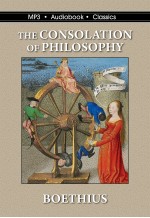Anicius Manlius Severinus Boethius
Anicius Manlius Severinus Boethius (c. 480–524 AD) was a
Roman philosopher, statesman, and scholar, widely regarded as one of the last
great figures of classical antiquity and a bridge to the medieval intellectual
tradition. Born into a prominent aristocratic family, Boethius was educated in
Greek and Latin, mastering the works of Plato, Aristotle, and other classical
thinkers. His knowledge and skills earned him high-ranking positions in the
Ostrogothic court of Theodoric the Great, where he served as a consul and later
as a magister officiorum (chief administrator). Despite his political success, Boethius fell victim to court
intrigue. Accused of treason, he was imprisoned and eventually executed in 524
or 525 AD. During his imprisonment, he wrote The Consolation of Philosophy, a
philosophical dialogue blending classical thought and Christian ideas. The work
became one of the most influential texts in medieval Europe, shaping
theological and philosophical discourse for centuries. Boethius also contributed significantly to the transmission
of ancient knowledge, translating Aristotle's works and writing on logic,
mathematics, and music. His legacy lies in his ability to synthesize classical
philosophy with emerging Christian theology, making him a crucial figure in the
intellectual history of the West. |
The Consolation of Philosophy
The Consolation of Philosophy by Boëthius is a philosophical work written around 524 AD while Boeth..
$9.99

